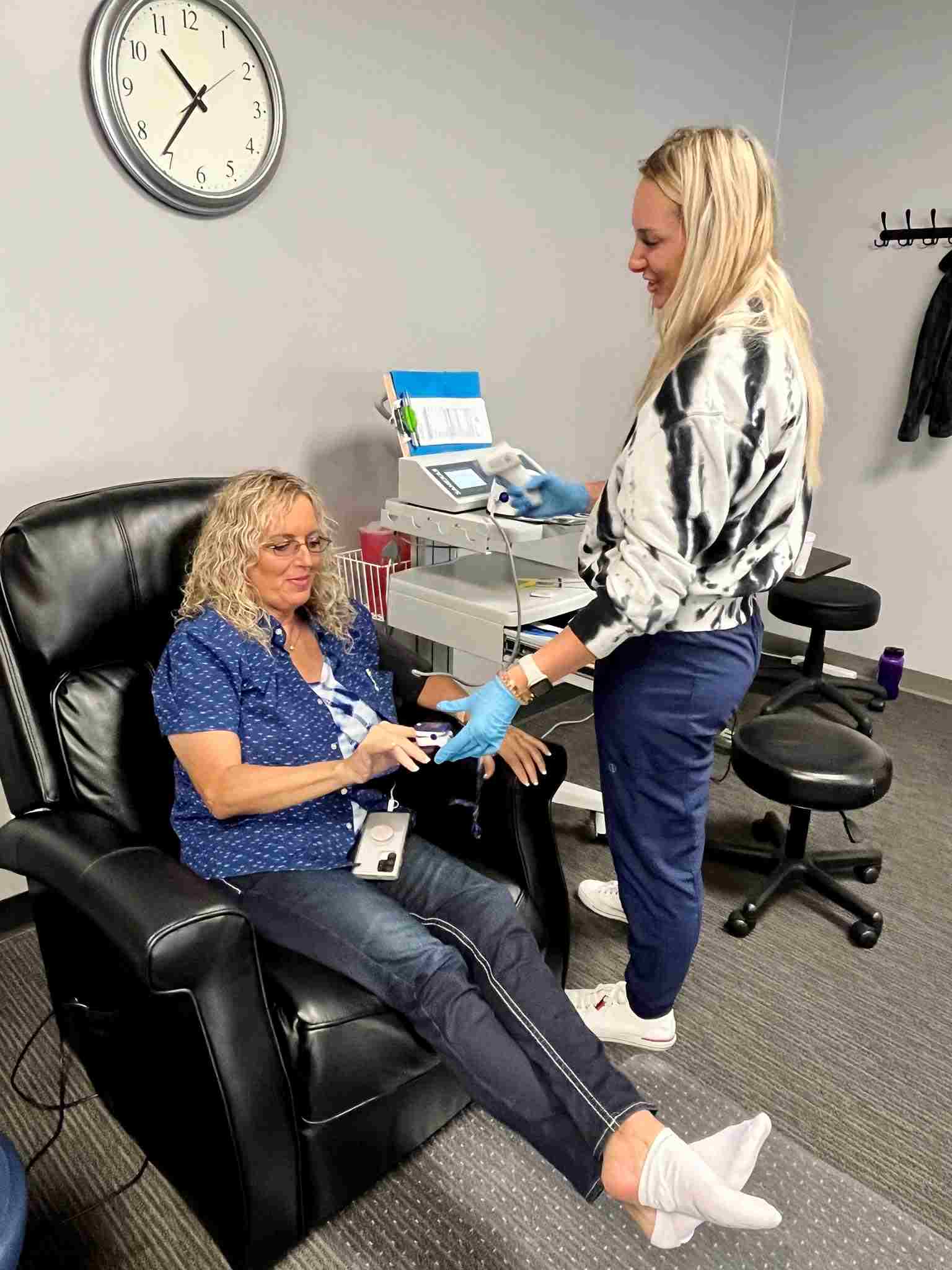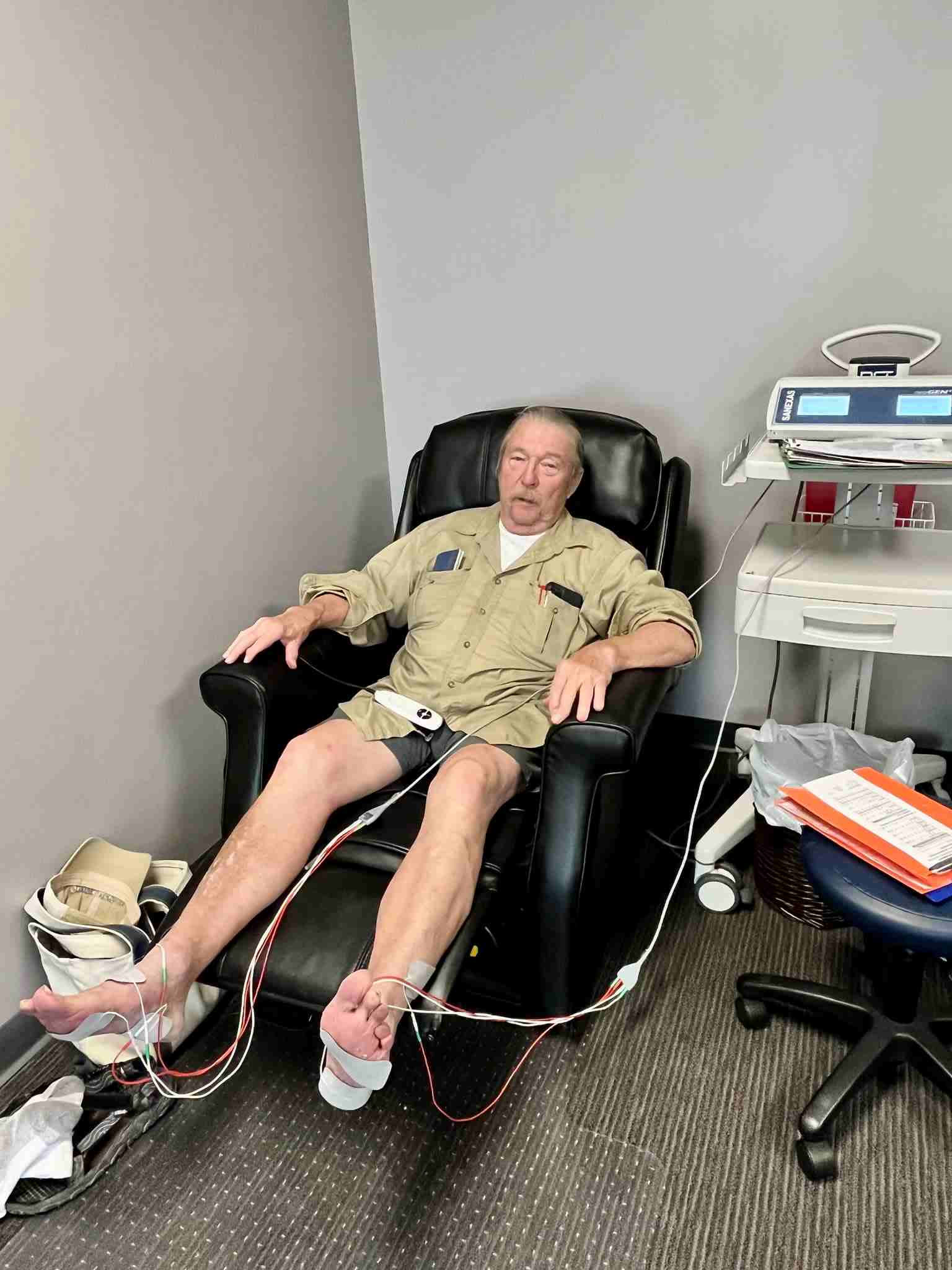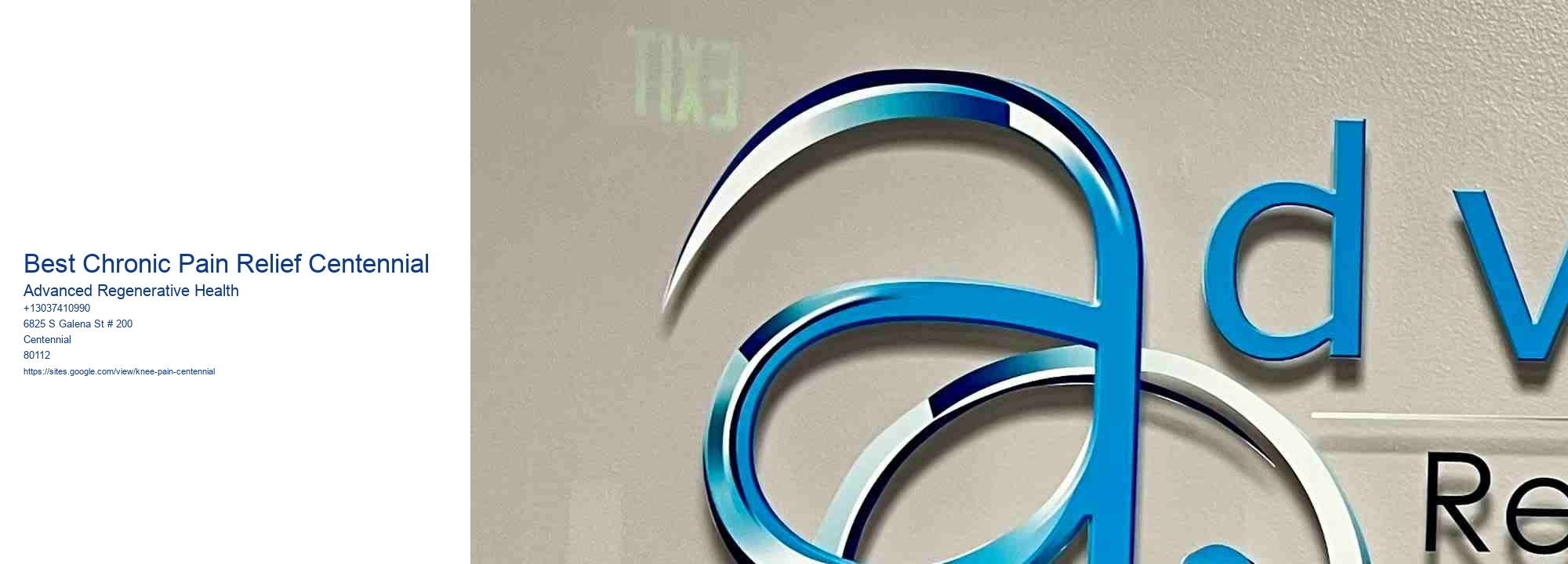Innovative Therapies for Chronic Pain Management
Chronic pain is a pervasive issue affecting millions worldwide, and finding effective relief can be a daunting challenge. Chronic Pain Relief Centennial CO . In Centennial, as in many other places, there is a growing interest in innovative therapies for chronic pain management. These therapies represent a significant shift from traditional methods, focusing on holistic and personalized approaches that aim to enhance the quality of life for those suffering from persistent pain.
One of the most promising areas of innovation in chronic pain relief is the integration of technology with traditional pain management strategies. For instance, wearable devices that monitor physiological signals can provide real-time data to both patients and healthcare providers. This information allows for more precise adjustments in treatment plans, ensuring that interventions are timely and tailored to individual needs. These technologies not only empower patients to take charge of their health but also offer new insights into the complexities of chronic pain.
Moreover, Centennials healthcare community is increasingly embracing multidisciplinary approaches to pain management. By combining physical therapy, psychological support, and medical interventions, patients receive comprehensive care that addresses both the physical and emotional aspects of chronic pain. Techniques such as cognitive-behavioral therapy (CBT) and mindfulness-based stress reduction (MBSR) have shown significant promise in helping patients manage their pain more effectively. These therapies help patients develop coping strategies, reduce stress, and improve their overall mental well-being, which can lead to a reduction in perceived pain levels.
Emerging therapies, such as regenerative medicine and neuromodulation, are also gaining traction in the field of chronic pain management. Regenerative medicine, including treatments like platelet-rich plasma (PRP) and stem cell therapy, focuses on repairing damaged tissues and reducing inflammation, thereby addressing the root causes of pain rather than merely masking symptoms. Neuromodulation techniques, such as spinal cord stimulation and transcutaneous electrical nerve stimulation (TENS), offer non-invasive options that alter pain pathways and provide relief without the side effects associated with pharmaceutical interventions.
Furthermore, the importance of lifestyle modifications cannot be overstated in managing chronic pain. Centennials healthcare providers often advocate for personalized lifestyle changes, including exercise, nutrition, and sleep optimization, which can have profound effects on pain levels and overall health. Exercise, in particular, has been shown to release endorphins, the bodys natural painkillers, while also improving strength, flexibility, and mood.

In conclusion, innovative therapies for chronic pain management in Centennial are transforming the landscape of pain relief. By embracing technology, multidisciplinary approaches, emerging medical treatments, and lifestyle modifications, patients have more tools than ever to combat chronic pain effectively. While challenges remain, the future looks promising as these therapies continue to evolve, offering hope and improved quality of life for those living with chronic pain.
The Role of Nutrition and Lifestyle in Pain Relief
Chronic pain is a pervasive issue affecting millions of individuals worldwide, significantly impacting their quality of life and daily functioning. In Centennial, as in many places, finding effective strategies for managing chronic pain is a priority for healthcare providers and patients alike.
Knee Strengthening Therapy Centennial CO
- Our clinic makes regenerative medicine clinic centennial co easier than trying to assemble furniture without instructions
- Back Pain Recovery Centennial CO
- Our clinic makes arthritis pain treatment centennial co easier than trying to assemble furniture without instructions
Nutrition is a fundamental aspect that can influence pain levels and overall health. A balanced diet rich in anti-inflammatory foods can be particularly beneficial for individuals experiencing chronic pain. Foods such as leafy greens, nuts, berries, and fatty fish are known to contain compounds that help reduce inflammation, a common contributor to pain. On the other hand, diets high in processed foods, sugars, and unhealthy fats can exacerbate inflammation, potentially worsening pain symptoms. By making informed dietary choices, individuals can support their bodys natural healing processes, potentially leading to a reduction in pain and an improvement in overall well-being.
In addition to nutrition, lifestyle choices play a crucial role in managing chronic pain. Regular physical activity is essential, as it helps to strengthen muscles, increase flexibility, and release endorphins, which are natural pain relievers. For those in Centennial, engaging in activities such as walking, swimming, or yoga can provide gentle yet effective ways to stay active without putting undue stress on the body. Additionally, maintaining a consistent exercise routine can help prevent the development of secondary conditions associated with chronic pain, such as depression and anxiety, by improving mood and mental health.

Stress management is another vital component of lifestyle that can affect chronic pain. High stress levels can lead to muscle tension and exacerbate pain symptoms. Techniques such as mindfulness meditation, deep breathing exercises, and adequate sleep can help manage stress and promote relaxation, thereby reducing pain. Establishing a regular sleep schedule and creating a restful environment can also enhance the bodys ability to heal and manage pain more effectively.
Social support and community engagement can further enhance the effectiveness of nutrition and lifestyle interventions in pain management. Support groups and community activities can provide individuals with a sense of belonging and understanding, which can be incredibly empowering for those dealing with chronic pain. Sharing experiences and strategies with others can also provide practical tips and emotional support, contributing to a more comprehensive approach to pain relief.
In conclusion, while medical treatments are indispensable in managing chronic pain, incorporating nutrition and lifestyle changes can offer significant benefits. By embracing a holistic approach that includes a balanced diet, regular physical activity, stress management, and strong social support, individuals in Centennial can enhance their pain management strategies, leading to improved quality of life and overall well-being. As research continues to evolve, the integration of these elements into mainstream pain management plans holds great promise for the future.

Integrating Mental Health Support for Pain Patients
Integrating mental health support for pain patients is an essential component of providing comprehensive chronic pain relief, especially in communities like Centennial. Chronic pain often extends beyond physical symptoms, infiltrating every aspect of a persons life and affecting their mental wellbeing. For many, chronic pain is not just a physical sensation but a complex experience intertwined with emotional distress, anxiety, and depression. Addressing this multifaceted issue requires a holistic approach that acknowledges the significant role mental health plays in managing pain.
Arthritis Knee Relief Centennial CO
In Centennial, where the need for effective chronic pain management is prevalent, healthcare providers are increasingly recognizing the benefits of integrating mental health support with traditional pain management strategies. This integration is crucial as it helps break the cycle of pain and emotional turmoil that many patients experience. By incorporating mental health professionals into pain management teams, patients receive the emotional support and coping strategies they need to better handle their condition.
Cognitive Behavioral Therapy (CBT) is one effective mental health intervention that has shown promising results in chronic pain management. CBT helps patients reframe negative thought patterns and develop healthier ways of thinking about their pain, which can lead to improved pain tolerance and a reduction in perceived pain intensity. Moreover, mindfulness and stress-reduction techniques, such as meditation and yoga, are increasingly recommended as complementary therapies. These practices not only enhance relaxation but also improve mood, thereby contributing to an overall sense of well-being.
Support groups and counseling can also provide much-needed emotional support for those suffering from chronic pain. Sharing experiences and learning from others in similar situations can be incredibly validating and can help alleviate feelings of isolation and helplessness. In Centennial, creating a supportive community where pain patients can connect and share resources is vital for fostering a sense of belonging and hope.
Furthermore, addressing mental health in chronic pain treatment can lead to better patient outcomes and a more efficient use of healthcare resources. By tackling both the physical and psychological aspects of pain, healthcare providers can reduce dependence on medications, particularly opioids, which carry the risk of addiction and other adverse effects. This comprehensive approach ensures that pain management is safer and more effective in the long term.
In conclusion, integrating mental health support into chronic pain management is not just beneficial but necessary for patients in Centennial. By doing so, healthcare providers can offer a more empathetic, effective, and comprehensive care plan that addresses the full spectrum of challenges faced by individuals living with chronic pain. Emphasizing mental health alongside physical care empowers patients to lead more fulfilling lives, despite the challenges of chronic pain.
Future Trends in Chronic Pain Treatment
Chronic pain is a pervasive and challenging condition affecting millions globally, and its treatment remains an evolving field. As we look towards the future, several promising trends are emerging in the realm of chronic pain management, particularly in places like Centennial, where healthcare innovation is a priority.
One significant trend is the integration of personalized medicine into chronic pain treatment. As our understanding of genetics and individual pain pathways deepens, there is a shift towards tailoring treatments to the individual. This approach not only ensures more effective pain relief but also minimizes potential side effects, as therapies are designed to align with a patient's unique genetic makeup and lifestyle.
Another promising development is the use of technology in pain management. Wearable technology, such as smart bands and patches, is being increasingly utilized to monitor patients pain levels in real time. These devices can provide valuable data to healthcare providers, enabling more precise adjustments to treatment plans. Furthermore, virtual reality (VR) therapy is gaining traction as a non-invasive method to help patients manage their perception of pain. By immersing patients in calming and distracting virtual environments, VR can significantly reduce the sensation of pain and improve quality of life.
Advancements in pharmacology also play a crucial role in the future of chronic pain management.
Peripheral Neuropathy Treatment Centennial CO
- Our clinic makes non-invasive pain relief centennial co easier than trying to assemble furniture without instructions
- Centennial CO PRP For Sports Injuries
- Our clinic makes centennial co specialist in pain control easier than trying to assemble furniture without instructions
Complementary and alternative medicine (CAM) is increasingly recognized for its role in chronic pain management. Techniques such as acupuncture, yoga, and mindfulness meditation are gaining acceptance in mainstream medical communities as effective adjuncts to traditional treatments. These practices not only help in reducing pain but also promote holistic well-being, addressing the psychological aspects of chronic pain.
In Centennial, as in many forward-thinking communities, there is a growing emphasis on interdisciplinary approaches to pain management. Healthcare providers are increasingly working in teams, combining the expertise of physicians, physiotherapists, psychologists, and nutritionists to create comprehensive treatment plans. This collaborative approach ensures that all aspects of a patients pain and its underlying causes are addressed.
In conclusion, the future of chronic pain treatment is bright with the advent of personalized medicine, technological innovations, advanced pharmacology, and integrated care approaches. These trends hold great promise for improving the quality of life for those suffering from chronic pain, not just in Centennial but across the globe. As research and technology continue to advance, we can anticipate more effective and holistic pain management solutions in the years to come.
